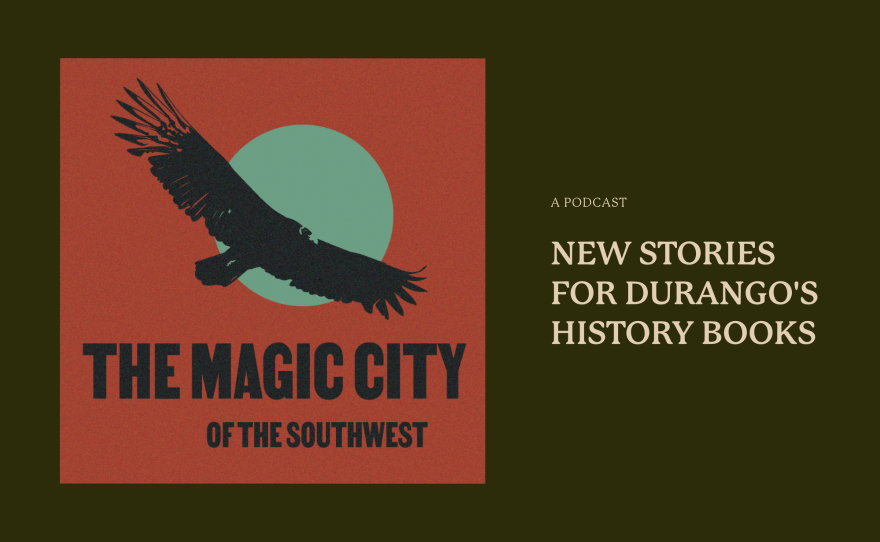The Magic City of the Southwest podcast airs on KSUT at 2 p.m. on the first Sunday of each month. Listen to the first episode here:
Other ways to listen
- Stream on the Magic City of the Southwest website
- Stream on Apple Podcasts
- Stream on Spotify
- Stream on Google Podcasts
When Kirbie Bennett and Jamie Wanzek visited the Westside Mobile Home Park on March 31, 2022, they had no idea the community was about to get big news. That day, Westside residents learned they had won a fight to buy the park from its previous owner. Bennett and Wanzek were there to interview Alejandra Chavez, a community leader and spokeswoman for Westside's campaign.
It was also the two reporters’ first time using field recording equipment.
“I think we’d spent about an hour learning how to operate the recorder before we got to Westside for that interview,” Wanzek said.
The audio they recorded that day would become a key piece of the first episode of The Magic City of the Southwest, a new podcast created in partnership with KSUT.
After conducting more interviews, Bennett and Wanzek approached KSUT Executive Director Tami Graham about possibly airing a series of stories focused on Durango history. Graham could see that the two journalists had found some amazing stories. She also recognized the project was complex and that they might need support.
"When Jamie and Kirbie approached me about the podcast, I immediately thought of Adam Burke as a great potential mentor and producer,” Graham said. “He’s a long-time partner with KSUT on various projects, including Native Braids, StoryCorps' One Small Step, and as our news team editor."
Burke started meeting with Bennett and Wanzek, first as a mentor and then as an editor, before ultimately joining the project to lead the creation of the podcast series and development of a project website.
The first episode recently premiered on KSUT.
“Kirbie, Jamie, and I like to geek out on nuance and complexity. We share an appreciation for the way narrative audio works on the mind to give you all the feels,” Burke said. “When we started working together, I never expected to be up to my armpits in this project. But that’s what happened, and I love the stories we’re working on.”
“Seeing our growth captured in the first episode is satisfying,” Bennett said recently. “Doing justice to that first story makes me more excited about what’s to come.”
The three launched Magic City Studios to produce the podcast and set the table for future projects. The podcast episodes will air on KSUT on the first Sunday of each month at 2 p.m. It's also available for streaming and download on all major podcast networks.
“The last several years, KSUT has prioritized collaborative projects with various media partners in order to elevate and improve our service to the region,” Tami Graham said. “Working with Adam, Jamie, and Kirbie to provide a platform for sharing untold and vitally important stories of Durango's history is an exciting new step. We couldn't be happier with the first episode and look forward to the ongoing Magic City series.”
Durango history that doesn’t make it into the brochures
The Magic City of the Southwest was inspired by the work of an informal group of local history enthusiasts in Durango. In early 2022, Bennett and Wanzek joined the group and discovered an abundance of archival documents, oral histories, and a range of new details that are not accounted for in the common telling of Durango histories.
Once the two journalists decided to launch a podcast, they applied for a grant from the city of Durango’s Lodger’s Tax: Arts and Culture program, which provided seed funding.
The first season of The Magic City of the Southwest explores pieces of Durango's history that don’t fit neatly inside the frame of a historic Western town, especially the many neglected and forgotten stories of non-white residents. The podcast will also address unflattering aspects of city history, such as the influence of the local chapter of the Ku Klux Klan in the first half of the 20th century.
The project weaves together many perspectives and realities, offering a fresh, nuanced history of the city while celebrating the lives and stories of those who have been literally and figuratively marginalized.
“Durango is a city of dichotomies,” said Bennett, who moved to Durango from Shiprock, New Mexico, to attend Fort Lewis College in 2015. “I felt those contradictions when I moved here, and I still feel them today. It’s a place I really care about, and working on this project has made me appreciate the city even more.”
Through a series of upcoming live events, the team hopes to spark a dialogue about the once and future identity of Durango as a community and as a magnet for visitors from around the world.
“One of my college professors said more than once that the purpose of journalism is to seek truth,” said Jamie Wanzek. “In this project, we’re working to reveal the truth, and it’s so challenging to do because truth is often so complex.”
In the first episode, the team tells a story that is barely history. Future episodes will explore events that occurred decades ago.
“We’re writing and producing for listeners in the here and now and for the historians of the future,” Adam Burke said.
“Last year, the Westside Mobile Home Park brought local and national coverage. Many people may have a vague sense of what happened there. But I think our first episode will surprise listeners. It's a portal to a deeper understanding of what those events mean to the residents of Westside and the community at large.”






